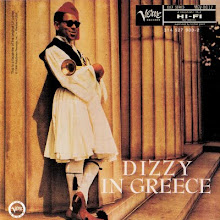
Ella in Hollywood is a live 1961 album by Ella Fitzgerald, with a jazz trio led by Lou Levy, recorded in Hollywood, Los Angeles. This album features Ella at the height of her vocal powers, one month before the recording of her most critically acclaimed studio album, Clap Hands, Here Comes Charlie!. Ella in Hollywood features several songs that serve as starting points for Ella's seemingly effortless scat solos ("Take the 'A' Train" is considered one of her best scat performances on record), and a selection of beautiful ballads balance out the album. For many years, the album was only available on CD as a Japanese import, but in April 2009 Verve finally gave it a worldwide CD release.
 There’s nothing rare about a joyous Ella Fitzgerald recording; the woman exuded joy in nearly every note she sang. Yet the level on these sessions soared higher and plumbed deeper. Gary Giddins, the veteran critic and author of “Jazz,” agrees. “This ranks on the top shelf of her live recordings,” he said. “It’s about as good as it gets.” The 1961 Crescendo gig, which took place from May 11 to 21 (with one night off), was booked as an afterthought to begin with, a time filler between a European tour that Fitzgerald and her quartet had begun in February and a monthlong stay at the Basin Street East in New York that June. Norman Granz took the unusual step of taping every set. But in the next year alone he and Fitzgerald recorded six studio albums, most of them with large orchestras, including two of her eight heavily promoted songbook albums, each devoted to standards by a prominent American composer. In this context it’s not so surprising that the Crescendo tapes received short shrift. “My guess,” Mr. Seidel said in a phone interview, “would be that Norman Granz was just recording Ella so much at the time, and was probably focused much more on her big studio projects.” Granz did pull 12 tracks from the roughly 14 hours of material recorded at the Crescendo and released them that year as an LP called “Ella in Hollywood.” But the album didn’t do well, perhaps because it sounded so strange. In between the songs, for reasons now unknown, someone spliced in loud applause that had been recorded in a large concert hall, making the whole album seem artificial. (The Crescendo was a nightclub of 200 seats). Whatever the reasons for the flat reviews and scant sales, the executives of Verve — which Granz had sold to MGM in 1960 — put the Crescendo tapes in the vault, where they were forgotten for the next 27 years (this refers to the 4-CD boxset also released by Verve in 2009).
There’s nothing rare about a joyous Ella Fitzgerald recording; the woman exuded joy in nearly every note she sang. Yet the level on these sessions soared higher and plumbed deeper. Gary Giddins, the veteran critic and author of “Jazz,” agrees. “This ranks on the top shelf of her live recordings,” he said. “It’s about as good as it gets.” The 1961 Crescendo gig, which took place from May 11 to 21 (with one night off), was booked as an afterthought to begin with, a time filler between a European tour that Fitzgerald and her quartet had begun in February and a monthlong stay at the Basin Street East in New York that June. Norman Granz took the unusual step of taping every set. But in the next year alone he and Fitzgerald recorded six studio albums, most of them with large orchestras, including two of her eight heavily promoted songbook albums, each devoted to standards by a prominent American composer. In this context it’s not so surprising that the Crescendo tapes received short shrift. “My guess,” Mr. Seidel said in a phone interview, “would be that Norman Granz was just recording Ella so much at the time, and was probably focused much more on her big studio projects.” Granz did pull 12 tracks from the roughly 14 hours of material recorded at the Crescendo and released them that year as an LP called “Ella in Hollywood.” But the album didn’t do well, perhaps because it sounded so strange. In between the songs, for reasons now unknown, someone spliced in loud applause that had been recorded in a large concert hall, making the whole album seem artificial. (The Crescendo was a nightclub of 200 seats). Whatever the reasons for the flat reviews and scant sales, the executives of Verve — which Granz had sold to MGM in 1960 — put the Crescendo tapes in the vault, where they were forgotten for the next 27 years (this refers to the 4-CD boxset also released by Verve in 2009).Track listing:
1. "This Could Be the Start of Something Big" (Steve Allen) – 2:33
2. "I've Got the World on a String" (Harold Arlen, Ted Koehler) – 3:44
3. "You're Driving Me Crazy" (Walter Donaldson) – 3:23
4. "Just in Time" (Betty Comden, Adolph Green, Jule Styne) – 1:56
5. "It Might as Well Be Spring" (Oscar Hammerstein II, Richard Rodgers) – 3:07
6. "Take the "A" Train" (Billy Strayhorn) – 9:04
7. "Stairway to the Stars" (Matty Malneck, Mitchell Parish, Frank Signorelli) – 3:56
8. "(If You Can't Sing It) You'll Have to Swing It (Mr. Paganini)" (Sam Coslow) – 4:05
9. "Satin Doll" (Duke Ellington, Johnny Mercer, Strayhorn) – 2:53
10. "Blue Moon" (Richard Rodgers, Lorenz Hart) – 3:17
11. "Baby, Won't You Please Come Home?" (Charles Warfield, Clarence Williams) – 3:41
12. "Air Mail Special" (Charlie Christian, Benny Goodman, Jimmy Mundy) – 5:26
Personnel:
* Ella Fitzgerald - Vocals
* Wilfred Middlebrooks - Bass
* Lou Levy - Piano
* Gus Johnson - Drums
* Herb Ellis - Guitar
Recorded live, May 11- May 21, 1961, Hollywood, Los Angeles







